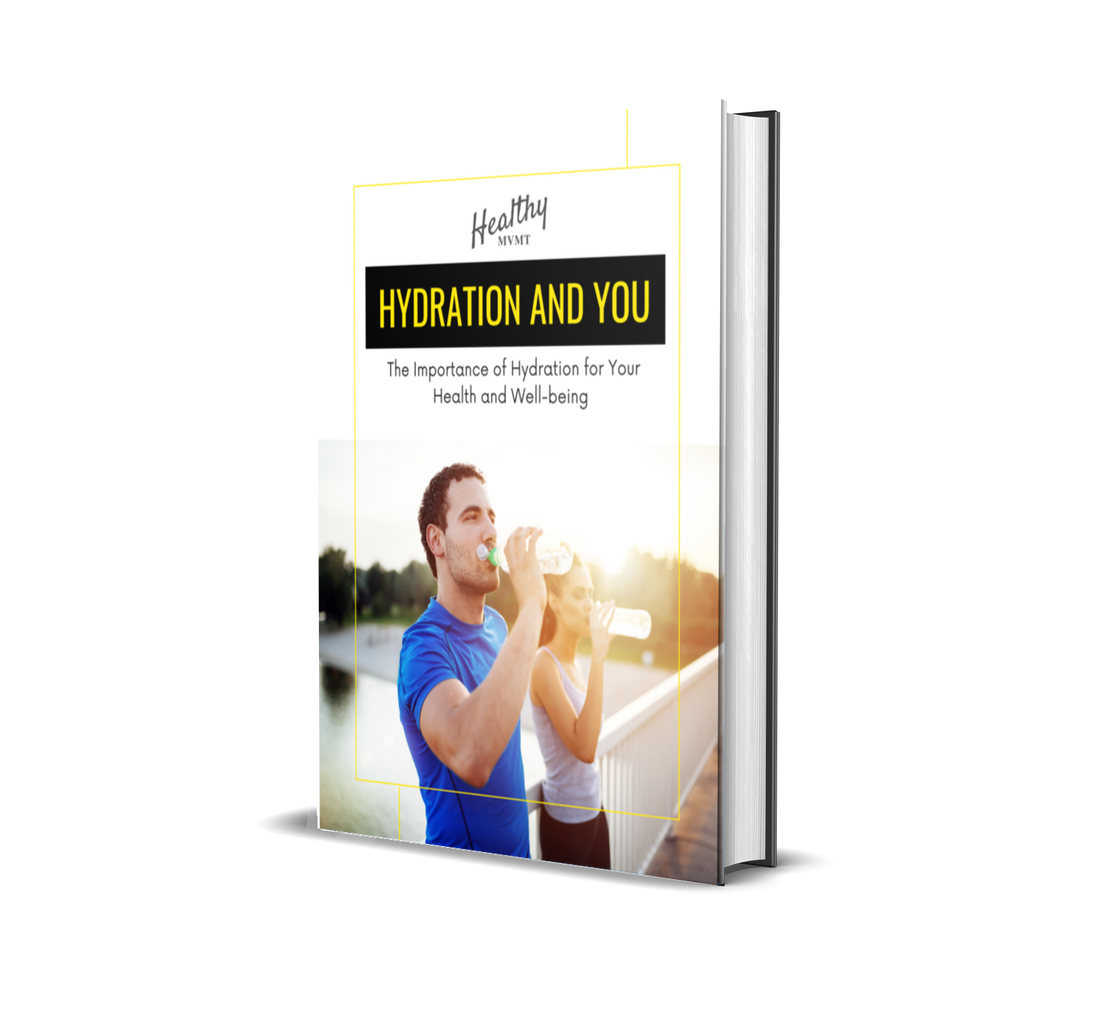The following is an excerpt from our book, Hydration and You. A FREE eBook available in our store.
Want to know just why it is so important to get your daily intake of water? Download this book now. It has seven chapters covering all of the ways our body needs water for a happy, healthy lifestyle.
Chapter 5: Water and Exercise
What about the importance of staying hydrated during exercise? Let’s explore the impact of dehydration on athletic performance, as well as the signs of dehydration to watch out for. We will also provide tips for properly hydrating before, during, and after exercise.
Functions of water in the body during exercise
Water is essential for the human body during exercise. It plays a crucial role in regulating body temperature, maintaining proper hydration, and facilitating the transport of nutrients to the muscles.
During exercise, the body generates heat and sweating is one of the mechanisms used to cool down the body. Sweating results in the loss of water and electrolytes. Nutrients such as sodium, potassium, and chloride. If the body loses too much water, it can lead to dehydration. Dehydration impairs physical performance and increases the risk of heat exhaustion stroke.
Drinking water during exercise helps replace fluids lost through sweating. Water maintains blood volume, and keeps the body's core temperature at a safe level. Water also plays a critical role in facilitating the transport of nutrients and oxygen to the muscles. Nutrients such as glucose and oxygen. These are essential for energy production and optimal performance.
Hydration Recommendations for Exercise
Pre-exercise hydration
Proper hydration before exercise is essential for maintaining optimal physical performance. Here are some tips on how to hydrate properly before exercise:
Start hydrating early. Aim to drink fluids regularly in the hours leading up to exercise. This will help ensure that you start exercise well-hydrated.
Drink water. Water is the best choice for hydrating before exercise. It is readily available, calorie-free, and can be easily absorbed by the body.
Avoid alcohol and caffeine. Both alcohol and caffeine can have a diuretic effect. Diuretics increase urine output and lead to dehydration. It is best to avoid them before exercise.
Monitor urine color. Check the color of your urine to assess your hydration status. Clear or light yellow urine indicates good hydration. Dark yellow urine suggests dehydration.
Drink enough fluids. The amount of fluid needed before exercise varies. It depends on factors such as body weight, exercise intensity, and environmental conditions. As a general rule, aim to drink at least 17-20 ounces (500-600 mL) of water 2-3 hours before exercise. Drink an additional 8-10 ounces (240-300 mL) of water 10-20 minutes before exercise.
By following these tips, you can properly hydrate before exercise. You ensure that your body is prepared for optimal physical performance.
During exercise hydration
Proper hydration during exercise is important to prevent dehydration. Here are some tips on how to hydrate during exercise:
Drink water regularly. The American Council on Exercise recommends drinking 17-20 ounces (500-600 mL) of water every 20 minutes during exercise. This will help replace fluids lost through sweating.
Consider sports drinks. If you are engaging in intense or prolonged exercise. Exercise lasting more than 60 minutes. Sports drinks containing electrolytes and carbohydrates can help maintain hydration levels. They also provide energy to the muscles. Be sure to check sugar levels on these drinks.
Drink according to thirst. Listen to your body and drink fluids when you feel thirsty. Thirst is an obvious indicator of your body's fluid needs.
Adjust fluid intake based on environmental conditions. Hot and humid environments can increase fluid loss through sweating. It's important to drink more fluids in these conditions.
Use a hydration pack or water bottle. Carrying a hydration pack or water bottle during exercise. This makes it easier to maintain proper hydration levels.
By following these tips, you can properly hydrate during exercise and ensure that your body is able to perform at its best.
Post-exercise hydration
Hydrating properly after exercise is essential for replenishing fluids. Here are some tips for hydrating effectively post-exercise:
Drink water. Drinking water is the best way to rehydrate after exercise. Aim to drink at least 16-20 ounces of water for every pound of body weight lost during exercise. For example, if you lost two pounds during exercise, you should aim to drink 32-40 ounces of water after your workout.
Include electrolytes. Electrolytes are minerals that help regulate fluid balance in the body. During exercise, you lose electrolytes through sweat, so it's important to replenish them post-workout. You can do this by drinking sports drinks that contain electrolytes. You can also eat foods that are high in electrolytes, such as bananas, avocado, and nuts.
Eat a balanced meal. Eating a balanced meal after exercise helps replenish energy stores and promote muscle recovery. Make sure your meal includes carbohydrates to replenish glycogen stores. You need protein to repair and rebuild muscle tissue. Also, healthy fats to aid in nutrient absorption.
Avoid alcohol and caffeine. Alcohol and caffeine are diuretics, which means they can dehydrate you. Avoid consuming these substances post-workout to ensure you're properly hydrating. Be sure to check the caffeine level of any energy drinks you may consume.
Monitor urine color. Monitoring the color of your urine determines if you're properly hydrated. If your urine is light yellow or clear, you're hydrated. If it's dark yellow or amber, you're dehydrated and need to drink more water.
Importance of electrolytes during exercise
Electrolytes are minerals. They play a vital role in maintaining fluid balance and proper functioning of the human body. During exercise, electrolytes are lost through sweat. This leads to dehydration and a decrease in athletic performance. Therefore, it's important to understand the importance of electrolytes and how to replenish them.
What are electrolytes?
Electrolytes are minerals that carry an electric charge in the body. The most important electrolytes for exercise are sodium, potassium, magnesium, and calcium. These minerals help regulate fluid balance, control blood pressure, and facilitate muscle contractions.
Electrolytes and exercise
During exercise, electrolytes are lost through sweat. The more you sweat, the more electrolytes you lose. If you don't replenish these electrolytes, it can lead to dehydration and a decrease in athletic performance. Electrolyte imbalances can also cause muscle cramps, fatigue, and dizziness.
Electrolyte-rich foods and drinks
There are several ways to replenish electrolytes during exercise. One way is to drink sports drinks that contain electrolytes. These drinks are formulated to replace the electrolytes lost through sweat. They help maintain fluid balance and energy levels.
Another way to replenish electrolytes is to eat foods that are high in electrolytes. Bananas, avocados, nuts, and leafy green vegetables are all good sources of electrolytes. Eating a balanced meal before and after exercise that includes electrolyte-rich foods can help maintain proper electrolyte balance.
Sports Drinks vs. Water
When it comes to hydration during exercise, there are two main options: sports drinks and water. Both have their benefits and drawbacks. It's important to understand the differences between the two.
Sports Drinks
Sports drinks are formulated to replenish electrolytes lost through sweat during exercise. They typically contain water, sugar, electrolytes (such as sodium and potassium). Sometimes they contain vitamins and minerals. Sports drinks can provide a quick source of energy. They help maintain proper fluid and electrolyte balance during intense exercise.
However, sports drinks can also contain high amounts of sugar and calories. This can be detrimental to those trying to lose weight or manage blood sugar levels. Additionally, sports drinks can be expensive. They may not be necessary for shorter, less intense workouts.
Water
Water is essential for hydration. It should always be the first choice for hydration during exercise. It's calorie-free and readily available. It is an easy and affordable option for staying hydrated. While water doesn't contain electrolytes, it can still help maintain fluid balance during exercise.
However, for longer or more intense workouts, water may not be enough to replenish the electrolytes lost through sweat. In these cases, sports drinks or electrolyte tablets may be necessary.
When to choose sports drinks over water
Sports drinks are often recommended during intense and prolonged physical activity. Think of prolonged activity as exercise that lasts for more than an hour. For shorter activities, sports drinks are helpful if they involve high intensity and sweating. This is because sports drinks contain electrolytes such as sodium and potassium. These minerals help replace the electrolytes lost through sweat during physical activity. Electrolytes are important for maintaining proper fluid balance, muscle performance, and nerve function. They help prevent dehydration.
In addition, sports drinks can provide a quick source of energy. These drinks contain carbohydrates. Carbohydrates are beneficial during prolonged exercise. During these periods the body's glycogen stores begin to deplete. The carbohydrates help delay fatigue and provide fuel for the muscles.
However, for shorter and less intense activities, water is usually sufficient. Water is essential for hydration. It helps regulate body temperature, transport nutrients, and lubricate joints. It is also calorie-free and readily available!
Ultimately, the decision between consuming sports drinks or water depends on the individual's needs. These include the intensity and duration of their physical activity as well as their overall health. If in doubt, consult with a healthcare professional or a certified sports nutritionist. They can determine the best hydration strategy for your individual needs.

